home > articles > apologetics > The Need To Learn To Discern

Ever hear something that didn’t quite sound right? Chances are that you discerned something. To discern means to judge, evaluate and distinguish. When you discern something you are potentially protecting both yourself and others from spiritual peril. So important is the ability to discern that Christ has specifically gifted the Church with a very special gift to ensure that it happens (First Corinthians 12:10). Yet, those who are gifted with discernment are often seen as judgmental, critical and therefore: unloving. What other gift of the Holy Spirit results in such rejection and dismissal as that of discernment? But what other gift of the Holy Spirit is needed more now than ever before? Here’s why.
And it is my prayer that your love may abound more and more, with knowledge and all discernment
Philippians 1:9
1. THE MODERN PROLIFERATION OF IDEAS
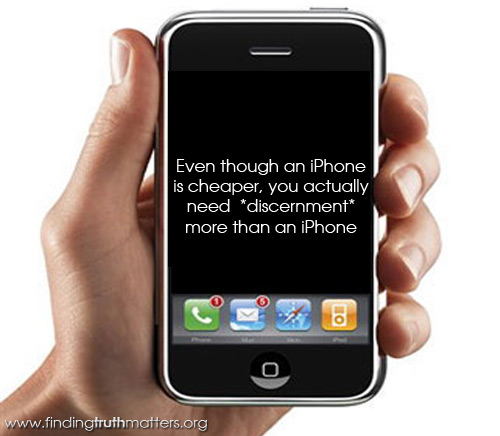 We now live in an age when ideas are spread globally within an amazingly short period of time. Over-generally, doctrinally orthodox Christians have been too slow to harness this. All the while, New Age Anti-Christ religions, Cultists, and Charismatic swindlers have revelled in this technological phenomenon. While the internet can enable much elegance, it can also enable massive misinformation. There is little regulation of internet content and bloggers can virtually say whatever they want. Sometimes this is helpful. Sometimes it is not. Therefore, Christians need discernment more than ever.
We now live in an age when ideas are spread globally within an amazingly short period of time. Over-generally, doctrinally orthodox Christians have been too slow to harness this. All the while, New Age Anti-Christ religions, Cultists, and Charismatic swindlers have revelled in this technological phenomenon. While the internet can enable much elegance, it can also enable massive misinformation. There is little regulation of internet content and bloggers can virtually say whatever they want. Sometimes this is helpful. Sometimes it is not. Therefore, Christians need discernment more than ever.
2. DIFFERING EXPRESSIONS OF CHURCH
 According to Patrick Johnson (Missiologist), there are now over 32,000 denominations of Christianity. Most of these denominations have no formal ministerial training requirements for their workers (pastors). The preachers in most of these churches are not vocationally professional in the sense that they have been trained to graduate level and do nothing other than concentrate on preaching / teaching / ministry). They are often classified as “bi-vocational”. These pastors often do not have the professional skill-set to expound the original intention of a Scriptural text or to discern the subtleties of doctrinal error being promoted by superstar tele-preachers. Because of the historically high number of bi-vocational pastors and the coinciding high number of tele-preachers in our times, the need for discernment among Christians is needed more than ever.
According to Patrick Johnson (Missiologist), there are now over 32,000 denominations of Christianity. Most of these denominations have no formal ministerial training requirements for their workers (pastors). The preachers in most of these churches are not vocationally professional in the sense that they have been trained to graduate level and do nothing other than concentrate on preaching / teaching / ministry). They are often classified as “bi-vocational”. These pastors often do not have the professional skill-set to expound the original intention of a Scriptural text or to discern the subtleties of doctrinal error being promoted by superstar tele-preachers. Because of the historically high number of bi-vocational pastors and the coinciding high number of tele-preachers in our times, the need for discernment among Christians is needed more than ever.
3. CHRISTIANS ARE PREDISPOSED TOWARD BELIEVING
 Christians believe in a God they can not see. Christians accept the testimony of a Book written thousands of years ago. Christianity is based on a subjective conversion experience and endorses the possibility of supernatural interaction such as visions, dreams, revelations, inner healing and claims to predict the future. Often there is no apparent objective way to determine whether these claims are true or not. This is rarely seen as a problem for Christians. But it makes Christians vulnerable to being deceived. History verifies this.
Christians believe in a God they can not see. Christians accept the testimony of a Book written thousands of years ago. Christianity is based on a subjective conversion experience and endorses the possibility of supernatural interaction such as visions, dreams, revelations, inner healing and claims to predict the future. Often there is no apparent objective way to determine whether these claims are true or not. This is rarely seen as a problem for Christians. But it makes Christians vulnerable to being deceived. History verifies this.
Down through the ages, the people who have been shown to be false teachers have been remarkably charming and winsome. That is, they are very nice people. Often when someone is accused of teaching something false someone else will defend them by saying “But they are such a nice person.”
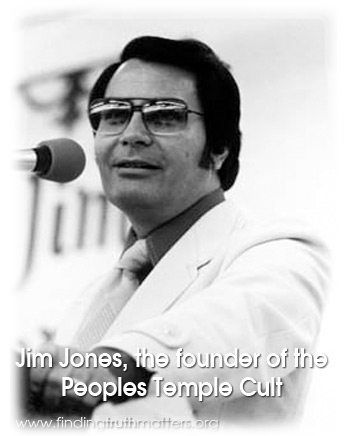 Jim Jones was nice and charming but he began teaching that he was God and eventually led hundreds of people to their suicidal deaths. He had won the approval of political leaders including Vice Presidential candidate, Walter Mondale, and eventual President Jimmy and Rosalyn Carter and the Mayor of San Francisco, Willie Brown. At a 1976 Testimonial Dinner in his honour, while introducing Jones, Mayor Willie Brown stated “Let me present to you what you should see every day when you look in the mirror in the early morning hours … Let me present to you a combination of Martin King, Angela Davis, Albert Einstein … Chairman Mao.” [Reiterman, Tim and John Jacobs. Raven: The Untold Story of Rev. Jim Jones and His People. Dutton, 1982. ISBN 0-525-24136-1. page 308] Dangerous ideas are often promoted by really nice people! It requires discernment to evaluate an idea, teaching, or doctrine without being beguiled by the teacher’s charm or winsome personality. This can be especially be difficult when it actually appears that the false teacher is genuinely being used by God to evangelise the lost. But because of the increased number of winsome and charming teachers who have gained a global platform through the sale of their books, television appearances or shows, radio programs podcasts and websites, the need for the gift of discernment has never been greater for Christians.
Jim Jones was nice and charming but he began teaching that he was God and eventually led hundreds of people to their suicidal deaths. He had won the approval of political leaders including Vice Presidential candidate, Walter Mondale, and eventual President Jimmy and Rosalyn Carter and the Mayor of San Francisco, Willie Brown. At a 1976 Testimonial Dinner in his honour, while introducing Jones, Mayor Willie Brown stated “Let me present to you what you should see every day when you look in the mirror in the early morning hours … Let me present to you a combination of Martin King, Angela Davis, Albert Einstein … Chairman Mao.” [Reiterman, Tim and John Jacobs. Raven: The Untold Story of Rev. Jim Jones and His People. Dutton, 1982. ISBN 0-525-24136-1. page 308] Dangerous ideas are often promoted by really nice people! It requires discernment to evaluate an idea, teaching, or doctrine without being beguiled by the teacher’s charm or winsome personality. This can be especially be difficult when it actually appears that the false teacher is genuinely being used by God to evangelise the lost. But because of the increased number of winsome and charming teachers who have gained a global platform through the sale of their books, television appearances or shows, radio programs podcasts and websites, the need for the gift of discernment has never been greater for Christians.
¶ Beloved, do not believe every spirit, but test the spirits to see whether they are from God, for many false prophets have gone out into the world.
First John 4:1
It seems like there are many non-Christian people who have realised there is a buck to be made from naive Christians. All they have to do is make their material sound Christian by throwing in vague quotes of Scripture or references to “God” or “Jesus” and many Christians can never tell the difference!
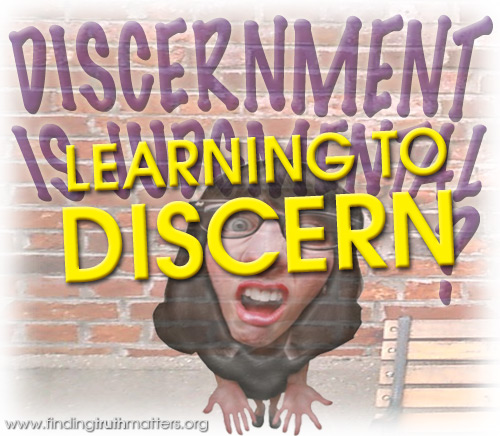 Christ has especially gifted certain teachers with the ability to discern what is in accord with His Word and what is at variance with His Word. To do this requires forming a reasoned judgment. Yet, to many Christians, any kind of judgment is wrong. After all, Jesus said Do not judge (Matthew 7:1). No! He didn’t (in the sense that many Christians claim)! Here’s why-
Christ has especially gifted certain teachers with the ability to discern what is in accord with His Word and what is at variance with His Word. To do this requires forming a reasoned judgment. Yet, to many Christians, any kind of judgment is wrong. After all, Jesus said Do not judge (Matthew 7:1). No! He didn’t (in the sense that many Christians claim)! Here’s why-
There are three types of judging in Scripture.
1. Final Judgment – the exclusive prerogative of Almighty God where the saved are finally redeemed and the rebellious are forever damned (see Romans 14:10; Second Corinthians 5:10).
2. Moral Judgment – is the consideration of what constitutes right, good, and wise conduct. Christians are commanded to make this kind of judgment (such as, First Corinthians 11:13) and to live accordingly. It also involves church leadership forming a moral judgment about a member’s conduct for church discipline issues (see, First Corinthians 5:12).
3. Discerning Judgment – is where a teaching is evaluated for its Scriptural accord. Believers are commanded to make this kind of judgment in First Corinthians 14:29 (note also Acts 17:11; 1Thess. 5:21).
Since the last two types of judgment are actually commanded in Scripture it must be apparent that Christ was referring to the first type of judgment when He commanded us not judge others. It is difficult though for some people to judge a person’s teaching without it seeming like they are judging the person. Even when a skilled apologist discerns that a teacher’s message is incorrect it sounds to many of these people that the apologist is actually attacking the teacher’s character. While a false teacher may need to be exposed for their improper lifestyle or financial abuse of their audience, there is a Biblically authorised distinction to be made between a teaching and a teacher. Saying to someone, “I don’t agree with that idea”, is not the same as saying, “I don’t agree with you.” How we express discernment therefore requires wisdom and gentleness.
They should gently teach those who oppose the truth. Perhaps God will change those people’s hearts, and they will believe the truth.
Second Timothy 2:25
 Pastors and elders are charged to protect their flock. This demands that pastors must be discerning. This task is made all the more difficult because the people of their congregations are probably exposed to less than helpful teaching through the plethora of books, cds, podcasts, TV preachers and talkshow hosts. In an already complex world, pastors now have to keep up with cultural trends in literature, art, movies, TV and theology.
Pastors and elders are charged to protect their flock. This demands that pastors must be discerning. This task is made all the more difficult because the people of their congregations are probably exposed to less than helpful teaching through the plethora of books, cds, podcasts, TV preachers and talkshow hosts. In an already complex world, pastors now have to keep up with cultural trends in literature, art, movies, TV and theology.
A good place for pastors to start is a book I’ve recommended around the world for the past two decades- How To Read The Bible For All It’s Worth by Gordon Fee and Douglas Stuart. This excellent book lays a foundation for further investigation into what makes for Biblical doctrine. I would then recommend a book by Professor J. Barton Payne- The Theology of the Older Testament. which paints a magnificent picture of the overall message of Scripture. If possible, bi-vocational pastors who have not completed their studies through a Bible College or Seminary should do a course in Hermeneutics by distance education. Naturally, I recommend ICI Theological College Australia to Australian Pastors, or Global University for American readers.
Pastors need to teach their people how to be discerning. This will sound like they are being judgmental. And they are- but in a Biblically authorised sense. They need to show their people who the Bible says God is and why Eckhart Tolle’s pantheistic ideas about God are not just wrong but dangerously wrong. Pastors need to teach their people the importance of prayer as communion with God and why neo-medieval mysticism is more akin to Hinduism or Buddhism than Biblical Christianity. Pastors needs to explain to their people why it is that God is a Trinity not merely three successive manifestations of a deity as T.D. Jakes teaches. Pastors need to teach their congregation the transcendence of the Almighty God and show why He most certainly does not live in a Shack despite what William Young claims. Pastors need to present a balanced view of giving so that the disgusting claims of certain Learjet flying TV evangelists are denounced. Pastors need to assure their flock that Christ is Lord of the future and nothing happens outside of His plan regardless of what Hal Lindsay said last week. Pastors need to make clear to their church family that Christianity does not need to be reinvented and that the claims of Jesus Christ are absolutely true despite what Rob Bell asserts. Pastors need to warn their people that Satan hates the preaching of the Gospel, the authority of leadership, the habit of publicly assembling on Sunday to worship God and the singing of praise to God, regardless of what Frank Viola, George Barna and Brian McLaren claim!
Pastors should consider input from the following podcasters-
|
Teacher
|
Podcast | Comments |
Greg Koukl |
www.str.org | Greg is quite genial in the way he presents his views. If you can’t handle Hank Hanegraaff then you’ll find Greg a whole lot easier to listen to. Greg is however strongly Pre-millennial, and while he admits that eschatology is not his strength, he still presents an Israel-centric (‘Dispensational’) eschatology which I have addressed in another article. I consider Greg to be a great discerner and one of the world’s leading Christian tacticians. |
Bill Craig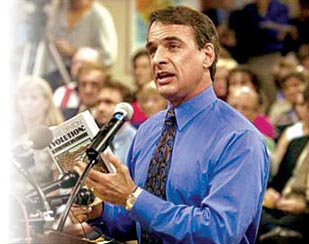 |
www.reasonablefaith.org | Bill Craig is perhaps one of the best Christian philosophers alive today, and certainly one of our best debaters. Those from a Reformed background will struggle with his concept of time and God’s sovereignty, but if this can be overlooked, you will greatly benefit from William Lane Craig’s ministry. He has an excellent discerning ministry. |
And naturally I recommend our own free weekly podcast- Finding Truth Matters. and would recommend visiting this site often and even subscribing to our free regular.
Good discerners find themselves in the middle of the Scepticism Dial-
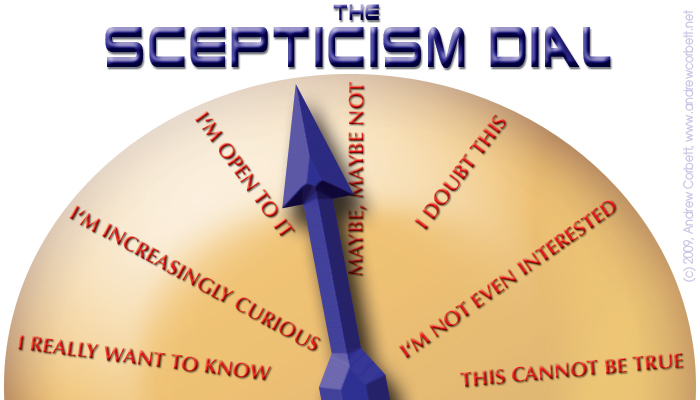
What do you have to do to become better at discerning? Do you have read every book on the NY Times bestseller list to be able to make an informed opinion about the pseudo-Christian theology promoted by Eckhart Tolle or William Young? Do you have to read Richard Dawkins’ books on mystical atheism to know that his assertions are not arguments and that they are irrational, contradictory and often mere speculation?
1. Good discerners look for the “big idea” first. Eckhart Tolle’s big idea is pantheism (everything is God). Although he refers to Jesus, it is not the same Jesus as the New Testament extols. The apostle Paul warned his original audience that people had already begun to do this in the first century-
For if someone comes and proclaims another Jesus than the one we proclaimed, or if you receive a different spirit from the one you received, or if you accept a different gospel from the one you accepted, you put up with it readily enough.
Second Corinthians 11:4
2. Good discerners know the difference between an assertion (an unsupported claim which is often just an opinion) and an argument (a claim supported by reasons). Often times false teachers promote their ideas without any real arguments. It takes discernment to recognise that someone’s arguments are without substance.
3. Good discerners understanding falsifiability. A good argument is provable or disprovable. When someone presents an argument a good discerner knows how to evaluate that argument to determine whether it is true or false. Like the Bereans of Acts 17, they will investigate the claims to ascertain whether they are factual. For example, Word-of-faith heresy teachers claim that when Jesus said it is easier for “a camel to go through the eye of a needle than for a rich man to enter the Kingdom of heaven” He wasn’t stating that the pursuit of riches and the pursuit of God were incompatible, rather He was, they claim, referring to a small gate used by late night travellers to Jerusalem when the main gates of the city were closed. Good discerners investigate such false claims and dismiss ridiculous myths like these.
Without good discernment within the Church, more people will be taken advantage of and even abused. Improving our ability to discern will help to guard our credibility from things that have the potential to make us look or sound stupid. May God help us to be more discerning. God knows we need it now more than ever.
Amen.
Why We Need To Learn To Discern [Printable Edition]
© March 30th 2009, Dr. Andrew Corbett, writing from Legana, Tasmania, Australia
This article may be copied and distributed if due credit is given to the author, the article is not altered, and the website- https://www.findingtruthmatters.org – is hyperlinked or referenced.
-
Sale!
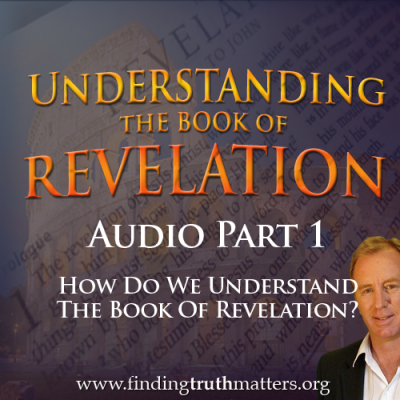
Understand The Book Of Revelation, Part 1 (Radio Edition)
Original price was: $1.25.$0.00Current price is: $0.00. -
Sale!
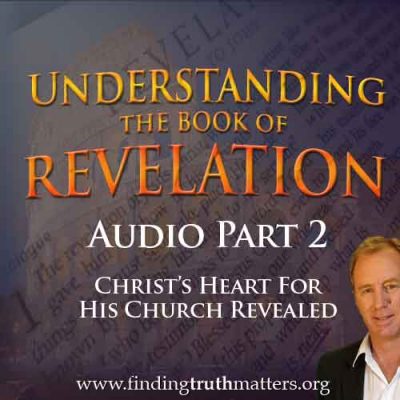
Understand The Book of Revelation, Part 2, Premium Audio Download
Original price was: $1.75.$1.25Current price is: $1.25. -
Sale!
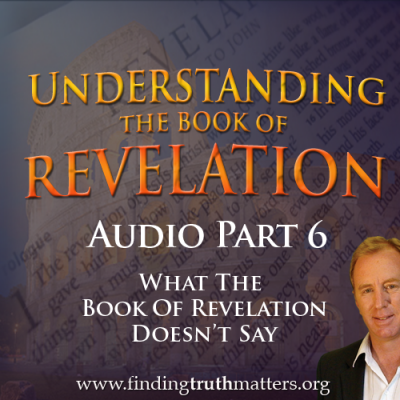
Understand The Book of Revelation, Part 6, Premium Audio Download
Original price was: $1.75.$1.25Current price is: $1.25. -
Sale!
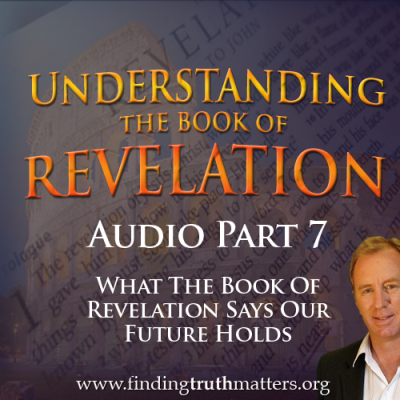
Understand The Book of Revelation, Part 7, Premium Audio Download
Original price was: $1.75.$1.25Current price is: $1.25.








































0 Comments